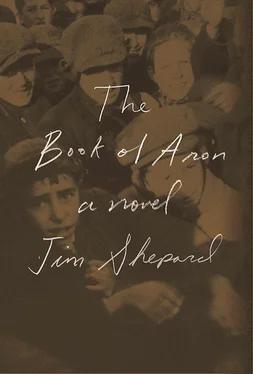Later that week they set up a soup kitchen and handed out free bread. The soldiers seemed to never be sure where they wanted everyone to line up. They enjoyed herding people from place to place. A little girl with big ears waited three hours in line with us and when she got her soup she handed it to Lutek and said she wasn’t hungry. After she left he told me she was a neighbor and that her parents and sister had been buried in their building during the bombardment. He said that when you saw the building you knew they wouldn’t be dug out until Christmas.
That night two Germans showed up at our door looking for furniture. They roamed around our apartment before deciding we had nothing they liked. They went next door to our neighbors with the radio and took two chairs and a soup tureen. The husband told us after they left that they’d pulled him around by the nose with pliers because he hadn’t said a courteous enough hello.
The next day the Polish police had taken over the soup kitchen and the soldiers were gone. Then the day after that the Polish police were gone and so was the soup kitchen.
THAT WINTER WE DID ALL OF OUR SCROUNGING IN heavy rain. Streets were like marshes because of the big dirty puddles between the cobblestones. We had to be careful because everything was extra slippery. It didn’t help that in January Jews could no longer be on the streets after nine and before five. Lutek’s father sometimes had to leave his crate where it was and get it in the morning. Most were so heavy that no one could steal them anyway. He told us about one of the other porters who claimed that because he was so ugly the Germans constantly interrupted his work to take pictures of him.
All Jews had to wear yellow armbands. Lutek said that the extra layer would help keep us warm.
There was always a new rule. My mother was upset about the one that made Jews show a delousing certificate to ride the trolleys. Then she was upset that we could no longer ride certain trolleys. Then she was upset that we had to declare our possessions and said it would be the first step in stripping us of everything we had. My father reminded her that the Germans had already been in our apartment and had found nothing worth taking.
Lutek and I rode whatever trolleys we wanted because he taught me how to wear a half-sleeve over a long-sleeved shirt so we could roll it down to cover our armbands. And he showed me how you had to jump off if the trolley drivers slowed in a certain way because it meant that Germans were waiting at the next stop. Once we jumped off right into some German police but they only took us by the collars and told us to help a doctor who was being made to empty all of the silver from his sideboard into some waiting cars. The doctor kept asking us to be careful with everything. After the last load he asked a German if he could keep his grandmother’s saltcellar, a little boat he showed us because it had great sentimental value for him, and the German said no.
“Who leaves so many things lying around?” my mother asked at dinner about the loot I brought home, and my father said what did she know about it, that she should be quiet and count her blessings.
“It’s a blessing he’s safe and I want to keep him that way,” she told him.
“Does he look like he’d do anything dangerous?” he said.
Lutek agreed this really was the best thing about me: that I didn’t. We specialized in pantry and bathroom windows that you wouldn’t think a cat could fit through. I’d give him a boost and then wait at the end of the alley for his whistle. If all was clear I’d whistle back and he’d dump whatever he’d found down to me and off I’d go, to meet up with him later on.
When it came to tools he had an eye for things you couldn’t find a use for at first. He lifted a thick short wire off the flatbed of a truck and it turned out to be perfect for working through a sash and casement, because once it was through it was rigid enough that you could tap the hook until it popped from the eyelet.
He had found someone who would trade most of what we got for most of what we wanted, so some days I’d bring my mother coal and some days flour and some days something else. One night I brought home almonds, but it didn’t matter because some women in fur coats had been ordered to wash the pavement with their underwear and then to put the underwear back on again, wet, and my mother and everyone else had been forced to watch, and she was still upset.
I told Lutek about it and he told me about having come across an old Jew atop a barrel with some German soldiers cutting his hair, with a crowd gathered around laughing. He said all they were doing was cutting his hair and he couldn’t tell how upset the old Jew was but that he’d told himself then and there he would never let himself end up on top of that barrel. So whatever else happened to him he could always say to himself, well, you’re not on top of that barrel.
We celebrated our big talk by stealing two expensive fountain-pen sets from a shop and hid them under our shirts while we waited for the trolley. The trolley was only two blocks away but it hadn’t moved for ten minutes and men were standing around the front of it.
We debated whether or not to just walk home. My shoes no longer fit and my blisters had broken, so I argued we should wait.
There was a girl sitting next to us and Lutek asked her who she was looking at. She asked him who he was looking at. “What kind of hat do you call that?” she asked.
He told her to go screw herself with an onion. An onion would be better than him, she said. Then she said those were Lamy pens we thought we were hiding. She recognized the cases.
I buttoned my top button and Lutek rubbed his eyes.
She suggested we take them to Siekierska’s in Wilanów. She explained when we didn’t answer that no one else would buy such expensive pens.
“Let’s just walk,” Lutek told me and then stood up. When I hesitated he went off without me.
I stayed beside the girl for another few minutes. “Your friend Rabbit Hat doesn’t take chances,” she said.
I asked what she thought had happened with the trolley and she said it was a good question. I told her my name was Aron and she said she hadn’t asked. I asked what her name was and she said Zofia, then turned and looked at me and shook my hand. I asked where she’d gone to school and she said over on Third of May Avenue. She said she’d been picked on as the only Jewish girl. I said she didn’t look Jewish. She had light hair and a small nose. She thanked me and then said that I did.
She asked if I knew Mańka Lipszyc, and I said yes. She asked if I was the one whose brother had just died and then was quiet at my answer.
The trolley never came. She told me she had a younger brother named Leon and an older brother Jechiel and a younger sister Salcia who was only ten months old.
She knew about the pens because her father had owned a stationery store. People came from all over the city for the quality of his paper. He supported their family, their grandmother, the unmarried Brysz girls, their Uncle Ickowicz, and Hanka Nasielska and her parents. For a while her family had so much money that she’d gone to the kind of preschool where you paid tuition. Her father had a sister in America who begged him to emigrate but he told her that he’d stay where he was in order to mind the shop.
After the Germans arrived they beat him severely and smashed around their apartment hunting for gold. They ended up taking only five meters of dress material from her mother. Even so, her family had been luckier than friends across the street who’d been thrown out of their house and told that their kind of people had slept far too long on soft beds. But then a week after that an SS officer stopped by the shop and was so impressed that he’d instructed her father to arrange to transport the shop’s entire stock back to the officer’s hometown. Her father had been given a receipt.
Читать дальше












